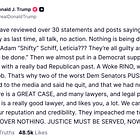Lindsey Halligan's bad bad week
Look out, Lionel Hutz.
Public Notice is supported by paid subscribers. Become one ⬇️
Even before this week, it was painfully obvious that Donald Trump’s pet lawyer, Lindsey Halligan, is entirely out of her depth, with both of her big splashy politically-motivated prosecutions spiraling out of control. This week, though, it became clear that she would be overmatched prosecuting a jaywalker.
Halligan did have one stroke of luck. Wednesday’s “whoopsie I forgot to show the James Comey grand jury my indictment!” news was so astonishing that it made people forget about Monday’s ruling by the magistrate judge in the case.
Is it good when a judge says that he “identified two statements by the prosecutor to the grand jurors that on their face appear to be fundamental misstatements of the law that could compromise the integrity of the grand jury process”? Because that’s what Magistrate Judge William E. Fitzpatrick said when he ordered the government to turn over grand jury materials to the defense.
Though both Monday’s and Wednesday’s humiliations of Halligan relate to the grand jury in the case, they are about two different motions filed by Comey. Monday’s order was about whether the government has to give the record of the grand jury proceedings to the defense. Wednesday’s hearing was about whether Comey was selectively and/or vindictively prosecuted.
Let’s take it from the top, shall we?
Federal courts have Article III judges — people nominated by the president and confirmed by the Senate for a lifetime seat. Then there are magistrate judges, who are appointed by the district court for fixed terms. Magistrate judges have flexible roles, so different federal courts use them in various ways. In the criminal setting, magistrates often hear pre-trial motions. A district court judge has the discretion to assign a magistrate to specific duties or proceedings.
That’s what is going on in Comey’s case. Judge Michael Nachmanoff is handling the trial, but he assigned Magistrate Judge Fitzpatrick to handle, among other things, Comey’s motion to unseal the grand jury testimony. On November 5, Fitzpatrick ordered the government to produce grand jury materials to the defense, which the government promptly appealed and whined about. Nachmanoff then tasked Fitzpatrick with determining whether the court had made “sufficient particularized findings to support the disclosure of the grand jury materials.”
It is extremely unusual for a defendant to win a motion to unseal grand jury testimony. But this is an extremely unusual case, which Fitzpatrick’s order makes amply clear:
“The Court recognizes this is an extraordinary remedy, but given the factually based challenges the defense has raised to the government’s conduct and the prospect that government misconduct may have tainted the grand jury proceedings, disclosure of grand jury materials under these unique circumstances is necessary.”
Congratulations, Lindsey Halligan! Being forced to disclose grand jury testimony because everything you did was wildly sketchy is indeed a rare and extraordinary achievement. All the administration’s whiny challenge to the order to produce materials managed to accomplish was netting them the 24-page order from Fitzpatrick that detailed all of Halligan’s missteps. Good job, prosecutor team!
About those “fundamental misstatements of the law”
Fitzpatrick reviewed the grand jury testimony and found that Halligan told the grand jury things that were just flat-out wrong. And we’re talking pretty obvious untruths here.
For instance, in response to difficult questions from the grand jurors, Halligan seems to have told the jurors that if she couldn’t answer a question, Comey would “answer these questions at trial.”
Hmm. Is it good when a US attorney — the top prosecutor in her jurisdiction! — doesn’t seem to know that criminal defendants cannot be compelled to testify? Or doesn’t seem to understand that the burden is on her to show Comey’s guilt beyond a reasonable doubt?
Fitzpatrick’s review also turned up Halligan suggesting to the grand jury that jurors didn’t have to decide whether there was probable cause to indict Comey based on the record before them, but the government might have more and better evidence at trial.
Hmm. Is it good when a US attorney seems to think that she can get a grand jury to indict someone based on a vague promise that there is totally other great evidence out there? No, you can’t see the evidence. It goes to another school. In Canada.
There’s another problem with the grand jury, which is that the sole witness to testify to it was an FBI agent who may have had access to privileged information, and having him testify was, as Fitzparick put it, “highly irregular and a radical departure from past DOJ practice.”
Well, everything here is a departure from past DOJ practice.
Speaking of departure from past DOJ practice, how about that Wednesday hearing?
Both Tyler Lemons, one of the random prosecutors picked up by Halligan to help with this mess, and Halligan herself told the judge in open court that the DOJ’s indictment was not shown to or approved by the grand jury. But hey, she showed it to a couple grand jurors!
Hmm. Is it good when a US attorney doesn’t present an indictment to the grand jury but charges someone under it nonetheless?
Judge Fitzpatrick actually teed up this discussion in his Monday order. He noted that the grand jury spent roughly two hours considering the three-count indictment. Around 6:40 pm — well after the grand jurors are supposed to be done for the day — Halligan was notified that the grand jury returned a true bill on two of the three counts. Halligan then marched herself over to the courtroom and returned the indictment at 6:47 pm.
As Fitzpatrick explained, seven minutes is not long enough for Halligan to learn the first indictment was rejected, draft and sign the second indictment, present that one to the grand jury, and give them time to deliberate and return a decision on the second indictment.
On Wednesday, Judge Nachmanoff tried to clear this up, which is where the real trouble began.
Though Lemons has been ostensibly handling this case, Nachmanoff called upon Halligan to explain her actions. She confirmed that only the foreperson and another grand jury member were present to see the two-count substitute indictment.
So, Halligan was only able to be that speedy because she took the three-count indictment the grand jurors rejected and then just eliminated the charge the jury rejected and called it good. She didn’t present this two-count indictment to the grand jury and just had the foreperson sign it instead.
This is another one of those “never attribute to malice that which is adequately explained by incompetence” moments. Is this a rookie mistake by someone who shouldn’t be in her job, or was it a deliberate attempt to evade grand jury scrutiny and get the indictment out the door because Trump wanted it? Perhaps both?
Which brings us to what Lindsey Halligan really cares about.
A clown show inside an exploding dumpster fire
Did Halligan leave the courtroom chastened on Wednesday, realizing that her screwup might tank her case? Nope! She left the courtroom mad at the judge and ran to the New York Post to wail about it in an “exclusive” interview. She floated the idea that Nachmanoff somehow violated the judicial conduct rules because he asked her if she was a “stalking horse” or “puppet” of Trump.
Hmm. Is it good when a US attorney who is already in trouble for her clueless Signal texts to Lawfare’s Anna Bower runs to the media immediately following a hearing where she had to admit in open court that her indictment was kinda maybe not an indictment at all?
Because Halligan knows nothing about prosecuting a case, and certainly doesn’t understand the selective and vindictive prosecution motion Comey brought, she decided the judge was attacking her: “Personal attacks — like Judge Nachmanoff referring to me as a ‘puppet’ — don’t change the facts or the law.”
But what Nachmanoff was asking about is the standard for a defendant who claims they have been vindictively prosecuted, and it’s literally the language in the test:
“A defendant claiming vindictive prosecution must show that (1) the prosecutor harbored genuine animus toward the defendant, or was prevailed upon to bring the charges by another with animus such that the prosecutor could be considered a ‘stalking horse.”
The term “puppet” also comes up in court cases where a defendant has alleged that they face a “sham prosecution” where someone is acting as a “mere puppet.”
Actual lawyers — especially prosecutors — know this. Halligan, however, embodies such a unique combination of incompetence and malice that she failed to understand the judge was inquiring about something at the heart of the case, using the language from other criminal cases — that’s the incompetence part. Then she ran to the New York Post to howl about personal attacks and to smear the judge — there’s the malice.
Now, if you’re wondering what happens next, join the club. If you’re thinking of buttonholing any lawyer friends so they can explain what on earth is going on here, know that they are likely as confused as you. There’s no roadmap for what happens next with this case. Does the indictment get thrown out? If so, does Halligan get to refile? Will the judge sanction Halligan? Will Comey move for sanctions?
Halligan’s missteps are stacking up, and it’s seeming more and more likely that Comey might manage to get the indictment thrown out. Since no other prosecutors will touch this case, she’s had to go it solo, and she has no idea what she does not know, and she’s too arrogant to learn from anyone.
And she certainly didn’t learn from her experience on Wednesday. Besides giving a wildly inappropriate interview to the Post, Halligan apparently decided it was a great idea to whip up a court filing yesterday “correcting the record” and saying that AkShUaLlY, the transcript totally shows she presented it to the whole grand jury.
Even if one were to stretch one’s brain to the breaking point to agree with this, Halligan is then stuck with a different problem: why on earth would she tell the court only two grand jurors saw the indictment if she knew she had presented it to the full grand jury? Halligan has done exactly two indictments, so it isn’t like these details would be hard to keep track of.
And in the end, why would she bother to learn how to do her actual job? She’s in this role to prosecute whoever Trump wants to prosecute. She has no qualms about ethically dubious behavior. She has no reservations about bringing charges when no one else will. She’s the perfect vessel for Trump’s rage, but she just might not be so great at closing the deal with an actual conviction. Good luck, Lindsey.
That’s it for today
We’ll be back with a new episode of Nir & Rupar this afternoon and a special Saturday PN tomorrow. If you appreciate today’s edition, please support our work by signing up for a paid subscription. Paid subscribers make this newsletter possible and keep it almost entirely free.
Thanks for reading.







Apparently, the poor dear Ms. Halligan shares at least 2 attributes with her puppet (yes, puppet) master: thin skin and a complete lack of self-awareness. Running to the NY Post to whine is pure orange-faced madman behavior. Clearly, she is out of her league but is so vapid, she doesn't realize it. If the Department of Injustice continues to serve up lawyers a la Ms. Halligan to prosecute its cases, I look forward to future slap downs by the judicial system for incompetence and out and out dismissals of bogus prosecutions.
Boo hoo. From the moment she was appointed, her lack of experience was called to attention. She is unqualified, period. Insurance claims and federal indictments are not the same thing. And the you hurt my feelings judge isn’t going to change any of the facts. She deserves whatever the judge throws at her. She didn’t have to take the job. Consequences need to be immediate. Thanks! Great insights here.❤️